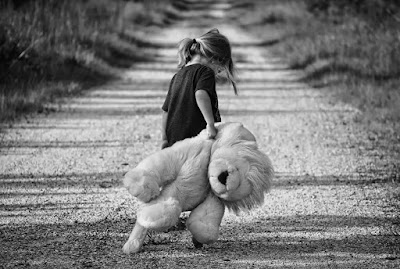My husband came home late last night to find me curled up in my favorite furry blanket, staring at the wall. He has found me like this many times before, often on days like this one, where I process a new traumatic memory in therapy. "Can I get you anything?" he asks.
"A better childhood," I reply. He nods and sits next to me. He knows I want him near, but I don't necessarily want to talk about it. It's exhausting to explain trauma to someone else when it's raw, and besides, it's not so much the event itself but the fallout from it that needs care. At the moment, that means I'm tapped into a deep well of sadness for the child in me who was neglected, terrorized, and so unloved.
This is a productive sadness.
It's progress. I have earned enough breakthroughs in recovery to know how important it is for me to fully feel this sadness. The old me probably would feel shame for being upset about something that happened so long ago. The old me probably would say, "I'm fine," when I'm clearly not. The old me would probably jump up to tend to my husband's needs- anything to distract me from my own. Instead, I sit, aware of my impulse to do these things and instead honor how important it is for me not to.
As someone who was actively ignored from birth, I now realize how much I used to be complicit with this way of relating to myself. I am now tasked with giving myself the retroactive attention that was starved from me. There are parts of me that still struggle with feeling "selfish" about having needs of any kind, but I am learning to bounce those thoughts over to the rational part of my mind where they can't survive.
It helps to picture this young, abused me as one of the impoverished children I sponsor. If I can have compassion for a stranger in another country deprived of proper food and shelter, surely I can have compassion for someone close to me who was deprived of love. Perhaps if I show her more compassion, perhaps if I validate her feelings, perhaps if I honor her right to exist and be loved, I will set the example for others to do the same.

Comments
Post a Comment